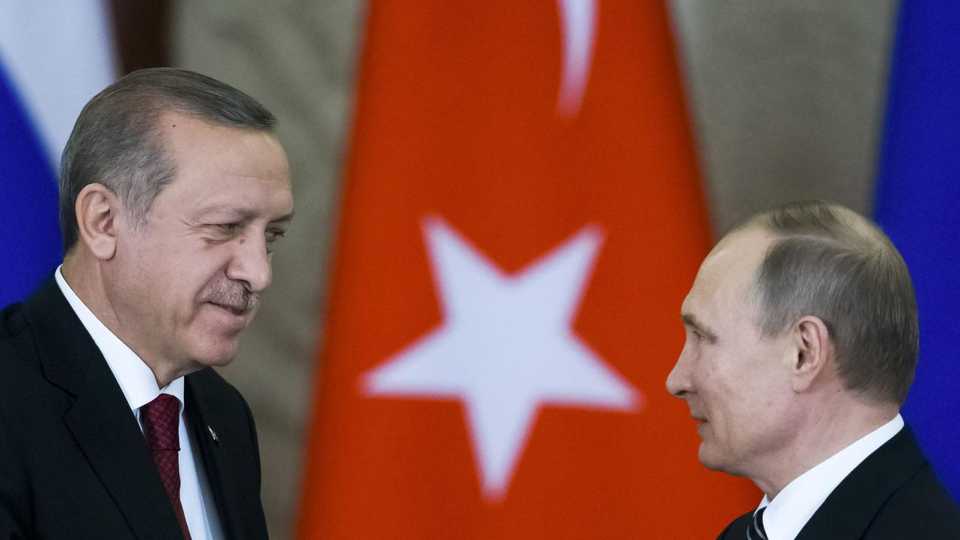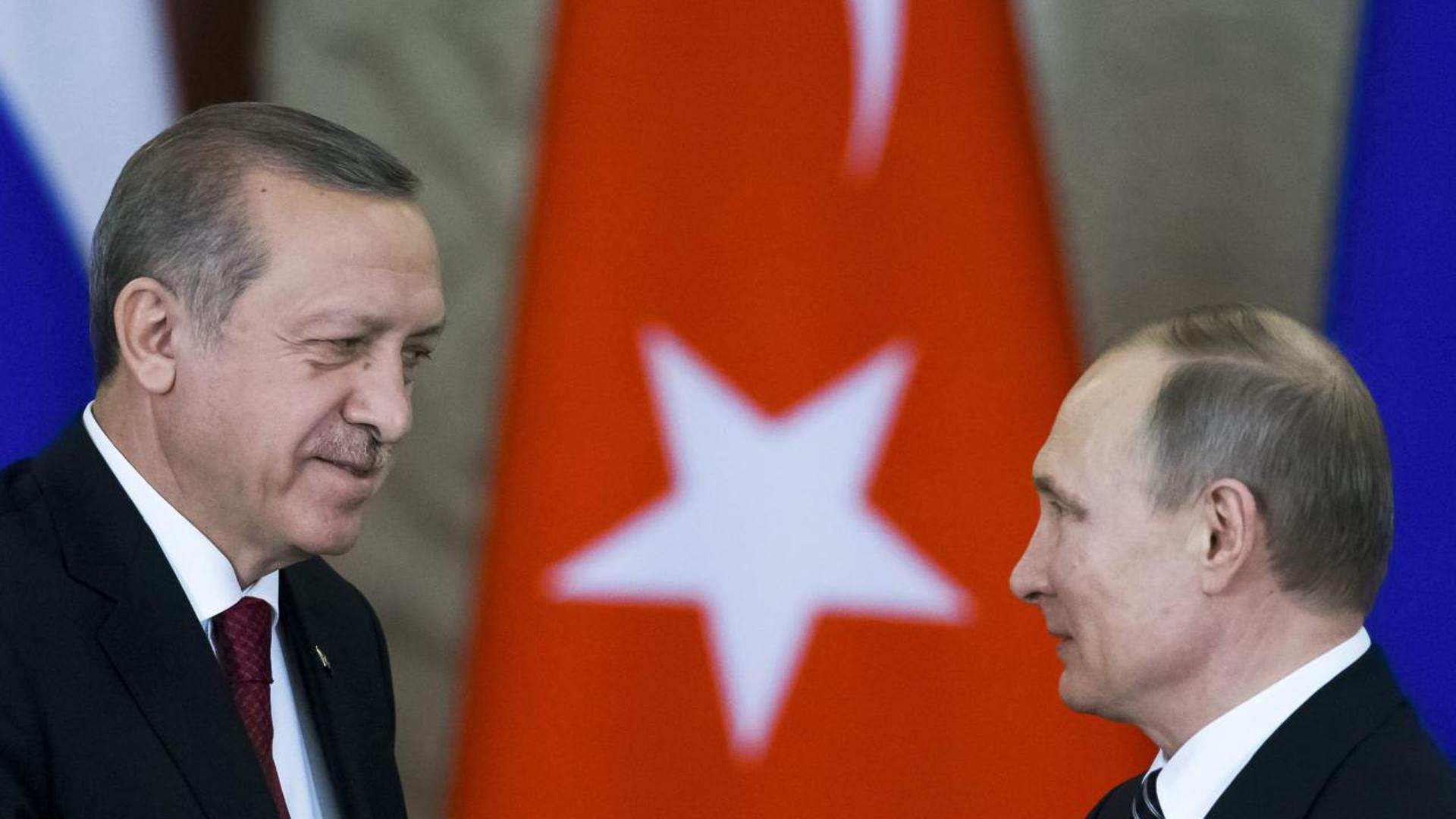
Russian President Vladimir Putin is visiting Turkey on Tuesday for the opening ceremony of Turkey’s first nuclear power plant construction which is being funded by Russia.
The two leaders have been in close contact and bilateral relations between Turkey and Russia have continued to improve since a coup against President Recep Tayyip Erdogan failed in July 2016 when Putin offered full support for him.
Despite backing different sides in Syria’s seven-year-old civil war, Turkey and Russia have been working on bringing an end to the crisis that has killed more than 400,000 people so far.
Turkey backs the moderate Syrian opposition, the Free Syrian Army (FSA), while Russia supports the regime leader Bashar al Assad.
On Wednesday, Erdogan, Putin, and Iranian President Hassan Rouhani will also have a meeting in Turkey to discuss Syria’s future.
Even though most European countries and the US back the opposition in Syria, Turkey chose to co-operate with Russia after the US started supporting the YPG on the ground. The YPG is the Syrian affiliate of the PKK, a US- and Turkey-designated terror group which has been fighting the Turkish state for more than 30 years. Russia has also ties with the group, but Turkish foreign minister Cavusoglu said “Russia understands Turkey’s stance on the YPG better than the US does, Russia doesn’t send any weapons to the YPG.”
In addition to relations on regional issues, Ankara and Moscow have have been working on boosting economic ties that were damaged following Turkey’s downing of a Russian fighter jet operating in Syria, after it violated Turkish airspace in November 2015.
As dozens of Russian diplomats were expelled from European countries and the US after Russia was accused of poisoning a former spy in the UK, Turkey has been strengthening its co-operation with Russia on energy, tourism, agricultural products, and a recent arms deal.
Co-operation on energy
Energy has formed the biggest part of economic relations between Ankara and Moscow as Turkey is heavily dependent on natural gas exports from Russia.
Co-operation in the energy industry between the two states has grown after they signed contracts for the Akkuyu Nuclear Power Plant project and TurkStream.
Russia’s power plant builder Rosatom and a number of Turkish companies are going to build a 4,800 megawatt plant in southern Turkey under a 2010 contract in a bid to reduce Turkey’s dependence on energy exports.
The two presidents will hold a video teleconference with the power plant for the opening ceremony.
TurkStream, which dates back to 2014 but was delayed due to the downing of the jet crisis, is a pipeline project that will bring Russian natural gas to Turkey through pipelines running beneath the Black Sea.
TurkStream is expected to be completed by the end of 2019.
Turkey is the second-biggest consumer of Russian natural gas after Germany. It already imports about 30 billion cubic metres annually via two pipelines, the Blue Stream, which passes under the eastern Black Sea, and the Western Line through the Balkans.
Erdogan and Putin are expected to discuss the relations on energy industry and other current projects.
Developing tourism
The downing of the jet crisis affected Turkey’s tourism industry the most. Nearly 4.5 million Russian tourists had visited Turkey in 2014, but the following two years witnessed a dramatic fall due to Russia’s suspension of visa-free travel from Turkey and discouraging its citizens to visit Turkey after the crisis.
In March, Turkish Culture and Tourism Minister Numan Kurtulmus said Turkey was planning to host more than six million Russian tourists in 2018.
Kurtulmus said he met 20 tour operators on the sidelines of the 25th Moscow International Travel and Tourism Exhibition.
“Recently, a very serious political crisis was experienced [between Turkey and Russia],” Kurtulmus said, but added there was no alienation between the people of both countries.
“The most concrete example of this is the 2017 tourist figures,” he said; 4.7 million Russian tourists visited Turkey in 2017.
Kurtulmus also said Russia was working on visa-free travel for Turks.
Lifting visa restrictions is also expected to be on the agenda during Erdogan’s meeting with Putin.
Agricultural products
Russia had imposed embargo on 21 agricultural products from Turkey following the jet crisis, including banning tomatoes worth $259 million. The ban affected Turkish exports which fell to $87,000 in 2016.
A statement released by Russia’s agricultural watchdog, known as Rosselkhoznadzor, announced that Russia might allow more tomato imports from Turkey, increasing the number of Turkish firms that export tomatoes to the country.
Negotiations between Turkish and Russian authorities are continuing, the agency added.
Russia recently allowed four more Turkish firms to export tomatoes to the country. In total, 12 Turkish companies are allowed to sell tomatoes to Russia.
Purchase of Russian defence systems
Turkey, bordering conflict zones in Iraq and Syria, has long asked to obtain an air defence system so as not to be dependent on Western weapons sent on loan by NATO allies.
When Ankara announced they were negotiating with Moscow on a deal, which would also include owning the technology by co-producing, NATO members expressed their concerns, saying the system might cause security breaches.
In July 2017, Turkey announced that it had inked a deal to buy an S-400 (NATO version SA-21 Growler) missile defence system for $2-3 billion from Russia.
“The problem is, how do you inter operate in the NATO system with Russians? They’ll never inter operate,” US Defense Secretary James Mattis told reporters.
“They went crazy because we made the S-400 missile agreement with Russia. What were we supposed to do, wait for you? We’ll paddle our own canoe, we are taking, and will take, all our measures on the security front,” Erdogan said during a speech.
And on December 2017, Russian news agency TASS quoted Sergei Chemezov, head of Russian state conglomerate Rostec, as saying that the finance ministries of Turkey and Russia had completed the negotiations and the first of the deliveries was scheduled for early 2020.
The agreement with Russia doesn’t prevent Turkey from participating in ongoing talks with NATO allies to discuss their offer for another missile system.
In November, Turkey signed a letter of intent with France and Italy to strengthen co-operation on joint defence projects. French-Italian EUROSAM consortium and Turkish companies will work together to see if they can have a deal on purchase of the SAMP-T missile systems.










Discussion about this post